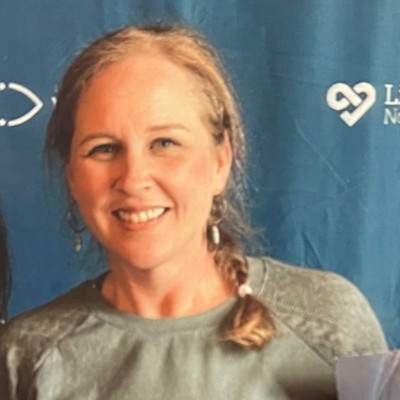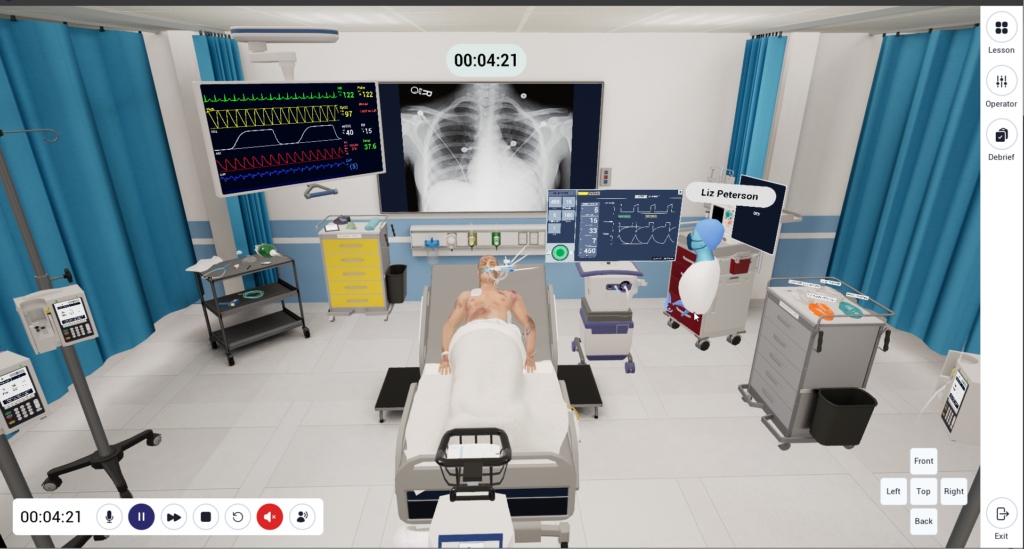
Bringing Organs, and Innovation, to Life: How VR is Revolutionizing OPC Training
In the United States, more than 100,000 people are currently waiting for a lifesaving organ transplant. Every day, 13 of them lose their lives while waiting, and every 8 minutes, another name is added to the list. Behind the scenes, there are countless individuals working to save as many lives as possible through the gift of organ donation. These frontline workers are holding together one of the most complex, high-stakes processes in healthcare: recovering viable organs to save lives through transplantation.
The real heroes in this story, though, are those selfless individuals who are donating their organs to save someone’s life. And LifeCenter wants to do everything in its power to honor the gift and save lives.
It’s no surprise then, that training organ procurement coordinators (OPCs) isn’t just important—it’s mission critical. And in a field where precision, speed, and empathy are non-negotiable, traditional training methods haven’t always kept up with the demands of the job.
Enter virtual reality.

LifeCenter Northwest is a federally designated organ procurement organization, serving Alaska, Montana, North Idaho, and Washington. With a vast and geographically diverse region, their team manages hundreds of donation cases annually, each one requiring expert clinical care, collaboration, and specialized training. Ensuring every team member is trained and prepared, regardless of location or experience level, is no small feat.
Liz recently walked us through the organization’s journey—from chalkboard to high-fidelity simulation to immersive, VR-based training. What started as a response to pandemic-era limitations is now evolving into a powerful, lasting part of how LifeCenter will prepare its clinicians to serve on the front lines of organ donation.

Simulation as a Launchpad: A Critical First Step
Before diving into VR, Liz first introduced high-fidelity simulation as a way to address gaps in clinical preparedness – especially in the complex area of donor medical management. Recognizing that hands-on practice in real-time isn’t always safe or feasible, she set out to develop a realistic, low-risk environment where clinicians could build and apply the critical skills needed to optimize organ donation outcomes. The ultimate goal: to increase the number of organs available for transplant.
“In 2022, we used high-fidelity simulation training to strengthen knowledge and understanding of ventilator management and lung recruitment,” Liz explained. “The following year, we continued to focus on targeted donor management skills, and after that immersive training, we didn’t just meet our goals—we reached a historic milestone. In one month alone, 42 organ donors provided 144 organs for transplant, honoring more donors and transplanting more organs than in any other month in LifeCenter’s history.”
The impact was undeniable, and those early successes instilled confidence to keep pushing forward. By starting with hands-on, scenario-based training, Liz gained strong support from senior leadership, demonstrated the effectiveness of immersive learning, and laid the groundwork for introducing VR. It was a thoughtful, strategic progression—designed to meet people where they were and continue building momentum along the way.

Life-Saving Precision: Care and Coordination in Organ Donation
For those unfamiliar, LifeCenter’s Organ Recovery Coordinators (ORCs) are the clinicians responsible for overseeing the medical care of organ donors in the ICU after brain death has been declared and donation has been authorized by the donor or their family. They oversee complex clinical testing and coordinate closely with hospital care teams, while additional LifeCenter staff work to support the donor’s family, match organs with recipients, and ensure every viable organ makes it to a recipient in time. It’s a highly technical and emotionally demanding role—a careful choreography of clinical care driven by the knowledge that each organ has the potential to save a life.
“Donor medical management can be incredibly complex,” Liz explained. “Ensuring each ORC is equipped with the knowledge, skill, and confidence to effectively navigate the complexities is vital.”
From Classroom to VR: An Evolution Born of Necessity
Before 2020, training new clinical teams was largely an in-person affair—think didactic lectures and on-the-job training in the field. Valuable? Absolutely. Scalable? Not even close.
Cue the pandemic. With travel restricted and in-person training paused, Liz and her team faced a critical question: how to continue onboarding mission-critical clinicians without compromising safety, while still delivering meaningful, standardized training.
That’s when they turned to Lumeto’s virtual reality platform.
From First Flight to Full Lift-Off
Building on the success of the initial simulation training in 2022, LifeCenter’s first use case for VR focused on ventilator management skills aimed at improving lung function and increasing the chances of lungs being deemed suitable for transplant, a historically challenging achievement. With VR, staff could navigate clinical decision trees, adjust ventilator settings, and interact with a realistic ICU environment without needing to be physically present in a hospital.
The expected results? More effective training. Greater clinician confidence. Improved organ oxygenation and perfusion. More organs recovered and successfully transplanted. More lives saved.
“Honestly, the feedback has been overwhelmingly positive,” Liz said. “There were a few who had to adjust to the tech, but there’s real excitement about having easy access to a learning tool that was once out of reach—a customized, standardized simulated environment that will help our teams build the confidence and skill to act decisively in the field.“
“VR was great! Hands down my favorite part of the training day. I think that it is going to be so beneficial for learning, and to be able to interact with donor patients in a non-stress environment will be so helpful” – M.T., ORC

Purpose Behind the Headset
As much as this story is about technology, it’s also about people. And at the center of that is purpose.
“There’s no greater connection to purpose than the work that we all do,” Liz shared. “Even though I’m a bit removed from the fieldwork these days, I’ll never forget the moments that remind me why we do this.”
LLiz paused to recall a donor case that’s stayed with her over the years: “I recently celebrated my 10-year anniversary at LifeCenter and was looking back through photos I’d taken over the years. One set stood out—they were from one of our annual donor celebration events. I’d attended many before, but that year was different. I was there to honor the life of a young donor I had worked with just months earlier. He was 16. A swimmer. A runner. A friend, a brother, a son. He and his sister had been in a car accident, and he became a donor. His lungs were transplanted into a man who would’ve died without them.”
What happened next still gives Liz chills.
“That man, the one who received the lungs, was at that event. I got to meet him, look him in the eye, and witness his gratitude for a second chance at life. I was able to hear him speak about the hero that saved his life. That full-circle moment… knowing what we did at the bedside, what the entire team did to honor that kiddo’s life, it’s just… that’s the key. That’s the ‘why.’”
Scaling with Smart Tech
Of course, implementing VR at scale comes with its own learning curve. Liz shared that the first phase has been focused on familiarizing staff with the VR headsets and environment. From there, they will begin integrating it into onboarding and self-directed learning pathways.
The next chapter is about expansion: building out the content library, refining current modules, and exploring new ways to simulate real-world scenarios, including using AI generated characters to simulate conversations in the setting of donation.
“Eventually, we’d love to incorporate a second AI character to simulate interacting with various members of the healthcare team,” Liz said.
“Communication is such a vital soft skill to practice and refine. The possibility of doing this in VR is incredible.”
Sharing the Innovation
Perhaps most exciting is what comes next. Liz and her team are eager to collaborate with other OPOs, sharing their experience and positive outcomes.

That’s the ethos behind it all: a deep commitment to the mission, paired with a willingness to innovate.
This April, A Spotlight on Life
April is National Donate Life Month—a time to honor organ, eye, and tissue donors and celebrate the incredible gift of life. It’s also an opportunity to recognize the dedicated professionals working behind the scenes—the nurses, respiratory therapists, physicians, and OPO teams—who show up at all hours to make these life-saving gifts possible.
We invite you to take a moment this month to consider registering as an organ, eye, and tissue donor. You can learn more and sign up at RegisterMe.org
VR training won’t ever replace the heart and grit of these professionals. But it is giving them the tools to do their jobs more efficiently, safer, and sustainably.
So this month, we tip our hats to the OPO teams everywhere who wake up every day ready to do something extraordinary. And to folks like Liz, who are proving that a headset and a little innovation can go a long way toward saving lives.
Want to learn more about VR-based training for healthcare?
We’d love to show you how Lumeto is working with leaders like Liz to transform clinical education—one simulation at a time.